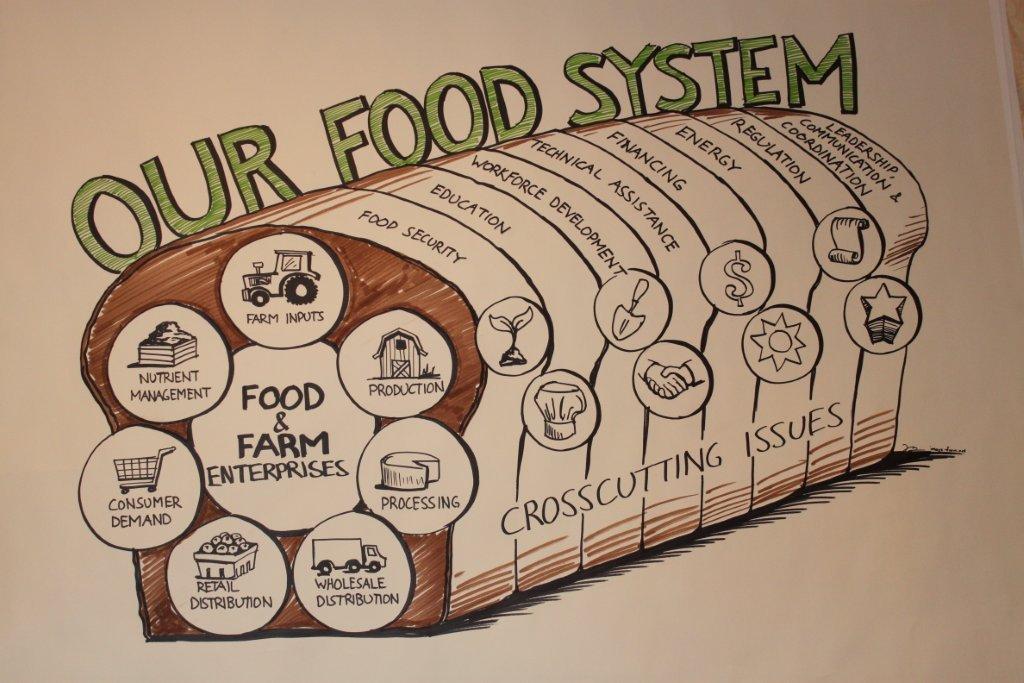Farm to Plate Annual Gathering: Taking Stock and Moving Ahead
October 23, 2012

From the expansion of Black River Produce into a 50,000 square foot meat processing facility and the 19 value-added food producers crafting away at the Mad River Food Hub, to Green Mountain Farm-to-School’s “Lunchbox” mobile farmers’ market and the emergence of several large in-state milk processors, Vermonters are working to “save the world in our own little way” says Chuck Ross, Secretary of the Agency of Agriculture, Food and Markets.
These were just some of the developments that flew fast and furious at the Annual Farm to Plate Network Gathering on October 9th and 10th, 2012 at Lake Morey Resort in Fairlee. The Annual Gathering presented a timely opportunity for nearly 200 Farm to Plate Network members to meet and reconnect with each other, review progress made in the first year of work, and plan for the coming year.
The Farm to Plate Network is made up of over 160 food system organizations and enterprises that have chosen to collaborate with each other in order to implement the 25 goals and numerous strategies of the Farm to Plate Strategic Plan. The Farm to Plate Strategic Plan is Vermont’s 10-year plan for creating food system jobs, boosting and diversifying food production, and increasing access for Vermont and regional consumers to healthy, fresh food.
Network members are organized into six working groups: Aggregation and Distribution, Consumer Education and Marketing, Education and Workforce Development, Farmland Access and Stewardship, Dairy Development, and Technical Assistance for Producers and Processors. Several Working Groups have formed Task Forces, which are sub-groups focused on “game-changing projects” identified by the larger Working Group. In addition, several Cross-Cutting Teams have come together to address big-picture change that weaves through all Working Groups, such as Financing, Soils & Water, Research, Policy, and Food Access.
The first day of the Gathering was spent listening to updates from each of the six Working Groups and several of the Cross-cutting Teams and Task Forces, as well as over 30 ‘snap shots’ of accomplishments by Network members. Event co-facilitators Curtis Ogden and Beth Tener pointed out that, while important, results are just part of the story. In their experience with all types of networks, they see a reciprocating triangle in which results, relationships, and processhave equal value. Importantly, change begins and ends with relationships, highlighting the value in gathering as a group for these two days.
On the first day Curtis and Beth asked network members to share what they had gained from participating in the network. Responses included:
- better conductivity,
- strength in numbers,
- quicker learning curve,
- encouragement to continue,
- continuing professional development,
- more collaboration than competition,
- increasing knowledge of valuable resources,
- conversations about how we evaluate success and we look at evaluation together, and
- mindset shift that we each have a piece of the answer, among others.
The first day concluded with facilitated small group discussions on the challenges and opportunities to working in networks in order to drive system-wide change.
The highlight of day one was the evening event: Pecha Kucha presentations from Chris Meehan (Vermont Food Bank), Tom Sabo (Montpelier High School and Center for Sustainable Systems), Sean Buchanan (Black River Produce), and Heather Darby (UVM Extension). Before the presentations began, we first learned how to say Pecha Kucha (Note: This link is to a Muppet video that is worth watching) – though the group was ultimately divided on this matter. These presentations, made up of 20 slides that advance automatically every 20 seconds, were lively and thought-provoking and brought participants on a food system journey from getting healthy food to low income Vermonters to developing Vermont’s grain industry.
The second day provided an opportunity for each Working Group to convene with an improved perspective on the Network as a whole. Plans for the year ahead were solidified and each group took the opportunity to glean input from new voices.
Later that afternoon participants got a sneak peak of the much anticipated Vermont Food System Atlas, a cutting edge online tool that will serve as a mapping and information clearinghouse for Vermont’s food system businesses and organizations, and will allow network members to communicate, share data, and keep up on Network happenings.
Day two concluded with updates from the other five New England states, which helped to put Vermont’s Farm to Plate Network into a regional context. A group of researchers from Food Solutions New England have developed a compelling vision for New England that estimates what it would take to grow, raise and catch at least 50% of our food needs from within the region. Representatives from Maine, New Hampshire, Massachusetts, Connecticut, and Rhode Island shared efforts currently underway in their respective states to increase access to local food and strengthen their food systems. With its established Farm to Plate Network, active working groups, and numerous accomplishments already logged, Vermont has crafted a process that other states in the region are learning from.
The Gathering closed with final comments from the facilitators Curtis Ogden and Beth Tener, and Ellen Kahler. Chuck Ross took the podium last, and reminded us of the importance of our work and our approach, and reflected on how far we’re come. “What a difference a year makes,” he commented.




